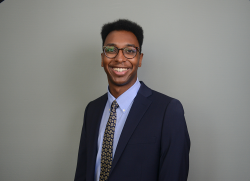


When I asked Max Holden '22, a senior engineering student, Stamps Scholar, and co-founder of the Dartmouth Energy Alliance, what he did this summer, he hesitated. "It's just going to sound like a lot of buzzwords."
But what may be buzzwords to most are real-world solutions to Max and his team at Accenture, a technology consulting firm that serves the energy and utilities industry among others. Max's role as an Consulting Analyst was to work on "pre-discovery" for Accenture's clients. This meant speaking with clients about specific issues, identifying the in-house technology that would ameliorate the issue, and pass that information down the pipeline to the firm's engineers.
Max was "lucky" in that he got actual facetime with clients, which is usually reserved for more experienced consultants. "It was hard but it got easier," he said. "The first client meeting was simultaneously exciting and challenging to hear new problems through a larger organizational lens. On top of that, I had to quickly grasp how we could leverage our digital capabilities for each specific opportunity."
One such technology that Max learned about in ideating utility use cases was digital twin, which is a real-time digital mirror of a utility's grid. Max describes its use to utilities in terms of grid resiliency: "You can change different inputs to see how it would be affected by the implementation of EVs or the implementation of batteries and really put a stress factor on to the grid to see how resilient it would be, which is a big consideration for top executives."
Max credits his success in this internship with lessons he's learned in past work experiences. During a pre-college gap year, he interned at a tech startup in Nairobi, Kenya focused on supplying clean ethanol as a replacement for coal as a cooking fuel. As a part of the market analysis branch, he was trying to figure out which price customers would pay for their product compared to competitor fuels, like coal, and had to be really attuned to his customers, something he took into his work in interpreting clients' problems at Accenture.
Max says the motivation behind his many energy-related experiences is definitely its connection to climate change, which he calls "the biggest problem to tackle in our lifetime for years to come." He wants to make an impact with his life for future generations. For students with similar mindsets, Max offered some succinct advice: "I would say try to find one niche of energy, seek it out and see if it's for you. Keep trying until you find one you like and learn about it." When I asked Max what he's settled on as his own niche, he's torn. At first, he says his niche is in utilities and grid planning. But then he pivots to talk about carbon markets, visibly excited about what he predicts will be an emerging, disruptive trend once climate risks lead to bigger financial risks.
Max clearly has an appetite to become an expert across the energy continuum, and is off to a good start. I am excited to see where that will take him.